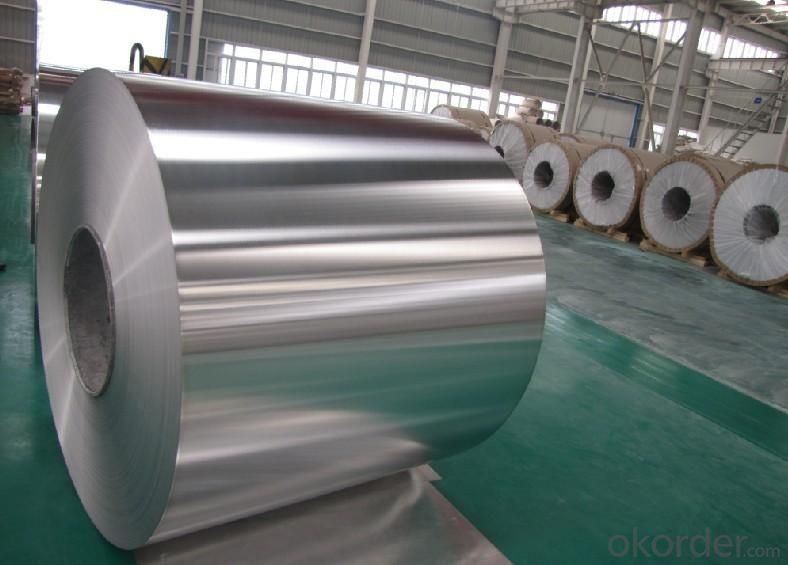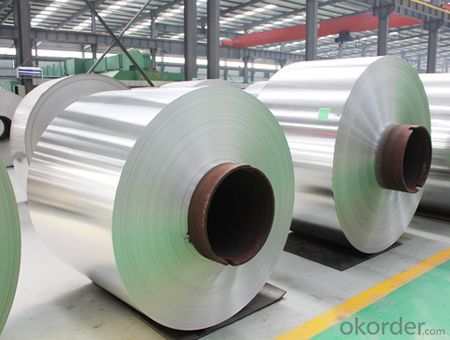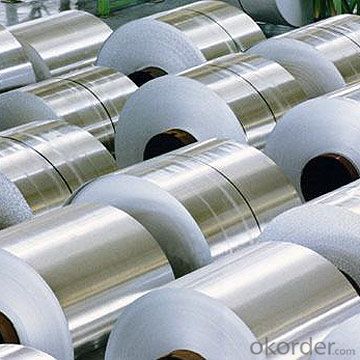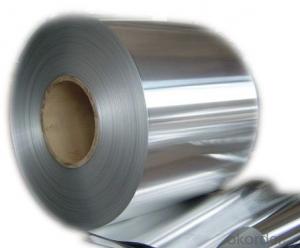Aluminum Strip / Coil/ Sheet/Plate 1070 0-H112
- Loading Port:
- Shanghai
- Payment Terms:
- TT OR LC
- Min Order Qty:
- 5 m.t.
- Supply Capability:
- 2000 m.t./month
OKorder Service Pledge
OKorder Financial Service
You Might Also Like
Structure of Aluminum Strip / Coil/ Sheet/Plate 1070 0-H112 Description:
Aluminum Strip / Coil/ Sheet/Plate 1070 0-H112are of a wide range of colors, which gives wonderful appearance no matter in residential and commercial constructions of great exhibition centers.
The coated aluminum coil/sheet have been widely used in the fields of construction and decoration( garage doors, ceiling etc.), electronic appliances, lighting decoration, air-condition air pipes, sandwich panels and drainages etc.
Main Features of theAluminum Strip / Coil/ Sheet/Plate 1070 0-H112:
1) High flexibility
2) Impact resistance
3) Excellent weather-proof durability
4) Anti-ultraviolet
5) High erosion resist
Images of the Aluminum Strip / Coil/ Sheet/Plate 1070 0-H112:



Aluminum Strip / Coil/ Sheet/Plate 1070 0-H112 Specification:
Alloy | A1100,A3003,A1050,A8011 etc |
Temper | H16,H18,H24 |
Thickness | From 0.024mm to 1.2mm |
Width | Standard width:1240mm |
Special width:1300mm,1520mm,1570mm,1595mm | |
Diameter | Standard dia:1200mm |
Interior dia:150mm,405mm,505mm | |
Weight | 2.5 T/coil,3.0 T/coil |
Coating | PE, PVDF, AC |
Surface | Embossed, mill finish, coated |
Color | AS to code RAL |
Gloss | 10-90%(EN ISO-2813:1994) |
Coating Thickness | PE: more than 18 micron |
PVDF: more than 25 micron | |
Coating Hardness (pencil resistance) | More than 2h |
Coating adhesion | 5J(EN ISO-2409:1994) |
Impact Resistance | No peeling or cracking(50 kg/cm,ASTMD-2794:1993) |
Flexibility (T-bend) | 2T |
MEK resistance | More than 100 |
FAQ:
a.What is monthly capacity
---CNBM is one stated own company and our monthly capacity is about 2000tons.
b. Now which countries do you export your goods?
---Now we export to South East Asia,Africa, North America,South America ect.
- Q:What’s the standard of tensile strength and ductility of aluminum coil 3003?
- Detailed description can help resolve problems quickly. Performance and status is a related. As aluminum coil is usually semi-hard, the tensile strength is greater than or equals 150, ductility is greater than or equals 12.
- Q:What are the common cleaning and maintenance products for aluminum coils?
- Some common cleaning and maintenance products for aluminum coils include mild detergents, non-abrasive cleaners, and aluminum coil cleaners. Additionally, soft brushes or cloths can be used to remove dirt and debris from the coils. It is important to avoid harsh or abrasive cleaners that can damage the aluminum surface.
- Q:What are the factors that affect the cost of aluminum coils?
- The cost of aluminum coils can be influenced by various factors. Firstly, the price of aluminum itself can fluctuate based on global supply and demand, as well as market conditions. These fluctuations directly impact the cost of aluminum coils. Secondly, the manufacturing process involved in producing aluminum coils plays a significant role in determining their cost. Different techniques, such as casting, rolling, and annealing, each have their own associated costs. The complexity and efficiency of the manufacturing process can directly affect the final price of the coils. Additionally, the size, thickness, and specifications of the coils can also impact their cost. Larger coils or those with specific dimensions may require extra raw materials, processing time, or specialized equipment, leading to higher costs. The type of surface finish applied to the coils is another factor that influences their price. Coils with higher-quality finishes, such as brushed or coated surfaces, require additional processing and materials, making them more expensive. Furthermore, the quantity and order volume of aluminum coils can affect their cost. Larger order quantities often result in economies of scale and lower unit costs. Conversely, smaller orders or customized specifications may incur additional setup costs or higher per-unit prices. The level of competition in the aluminum coil industry also plays a significant role in pricing. Increased competition among manufacturers can lead to more competitive prices as companies vie for customers. Conversely, limited suppliers or unique product offerings can drive prices higher due to reduced competition. Transportation and logistics costs are another factor to consider. The distance, mode of transportation, and fuel prices impact shipping costs, which can be passed on to customers. It is important to note that these factors are not exhaustive and may vary depending on specific circumstances and market dynamics. Additionally, external factors like taxes, tariffs, and government regulations can also influence the cost of aluminum coils.
- Q:What is the typical electrical resistivity of aluminum coils?
- The typical electrical resistivity of aluminum coils is around 2.65 x 10^-8 ohm-meters.
- Q:What are the common sizes and dimensions of aluminum coils?
- The common sizes and dimensions of aluminum coils vary depending on the specific application and industry requirements. However, some commonly used sizes include widths ranging from 2 inches to 60 inches and thicknesses ranging from 0.008 inches to 0.25 inches. The length of the coils can vary as well, depending on the customer's needs.
- Q:Are aluminum coils more expensive than other coil materials?
- In general, aluminum coils tend to be pricier compared to other coil materials. This is primarily because the production cost of aluminum is higher than that of metals like copper or steel. Moreover, aluminum coils command a higher price due to their exceptional resistance to corrosion, lightweight properties, and superior thermal conductivity. It is important to consider that the cost may fluctuate depending on variables like the coil's thickness, size, and specific usage.
- Q:Are there any limitations on the welding or soldering of aluminum coils?
- Welding or soldering aluminum coils comes with limitations. Aluminum is a reactive metal with a low melting point, making it more challenging to weld or solder compared to other metals. One limitation is the formation of oxide layers on the aluminum surface, which prevents strong bonding during the welding or soldering process. These oxide layers must be removed beforehand, either through chemical cleaning agents or mechanical methods like abrasive cleaning. Another limitation is aluminum's high thermal conductivity, which leads to rapid heat dissipation. This makes it difficult to reach and maintain the necessary temperature for welding or soldering. Overcoming this limitation may require specialized techniques and equipment, such as high-frequency welding or preheating the aluminum. Moreover, aluminum is prone to deformation or warping under high temperatures. This can cause distortion or changes in the coil's shape during welding or soldering. To minimize this, proper clamping or fixturing techniques are often necessary. Furthermore, using filler materials in welding or soldering aluminum coils can be challenging. Aluminum has a relatively high thermal expansion coefficient, meaning it expands and contracts significantly with temperature changes. If the filler material doesn't have a similar expansion coefficient, it can lead to cracks or weak joints. To address this, specialized filler materials like aluminum-silicon alloys are commonly used. In conclusion, while it is possible to weld or solder aluminum coils, it requires specialized knowledge, techniques, and equipment to overcome the limitations posed by the metal's reactivity, heat dissipation, deformation, and filler material selection.
- Q:Can aluminum coils be painted for custom designs?
- Yes, aluminum coils can be painted for custom designs. Aluminum is a versatile material that can be coated with various paints and finishes, allowing for a wide range of custom design options.
- Q:Are aluminum coils suitable for lightweight panel applications?
- Yes, aluminum coils are suitable for lightweight panel applications. Aluminum is known for its lightweight and corrosion-resistant properties, making it an excellent choice for lightweight panel applications. Aluminum coils can be easily formed and shaped into panels of varying sizes and thicknesses, making them highly versatile. Additionally, aluminum has a high strength-to-weight ratio, allowing for the creation of strong and durable lightweight panels. These panels find applications in various industries such as automotive, aerospace, construction, and transportation, where weight reduction is important. Overall, aluminum coils are a suitable choice for lightweight panel applications due to their lightweight nature, corrosion resistance, versatility, and strength.
- Q:Can aluminum coils be used for heat recovery systems?
- Indeed, heat recovery systems can utilize aluminum coils. Due to its exceptional heat conductivity, aluminum stands as an optimal option for heat transfer. In heat exchangers and heat recovery systems, aluminum coils frequently play a pivotal role in effectively transferring heat between different mediums. These coils are specifically engineered to maximize surface area, thereby enabling enhanced heat transfer. Furthermore, the lightweight and corrosion-resistant nature of aluminum renders it both durable and well-suited for a diverse range of applications within heat recovery systems.
1. Manufacturer Overview |
|
|---|---|
| Location | |
| Year Established | |
| Annual Output Value | |
| Main Markets | |
| Company Certifications | |
2. Manufacturer Certificates |
|
|---|---|
| a) Certification Name | |
| Range | |
| Reference | |
| Validity Period | |
3. Manufacturer Capability |
|
|---|---|
| a)Trade Capacity | |
| Nearest Port | |
| Export Percentage | |
| No.of Employees in Trade Department | |
| Language Spoken: | |
| b)Factory Information | |
| Factory Size: | |
| No. of Production Lines | |
| Contract Manufacturing | |
| Product Price Range | |
Send your message to us
Aluminum Strip / Coil/ Sheet/Plate 1070 0-H112
- Loading Port:
- Shanghai
- Payment Terms:
- TT OR LC
- Min Order Qty:
- 5 m.t.
- Supply Capability:
- 2000 m.t./month
OKorder Service Pledge
OKorder Financial Service
Similar products
New products
Hot products
Hot Searches
Related keywords




























